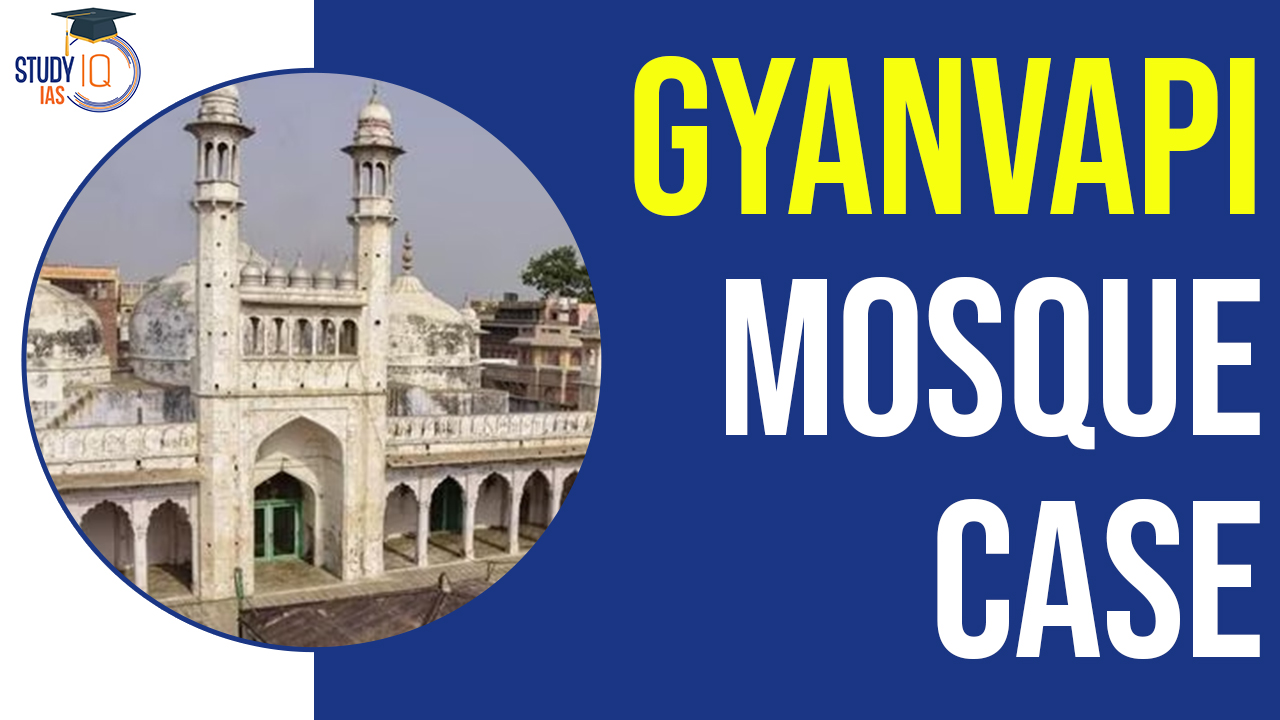Table of Contents
Gyanvapi Mosque Case
The Gyanvapi Mosque case, centered around the Gyanvapi complex in Varanasi, has been a long-standing legal battle fraught with historical and religious complexities. The recent green light given by the Varanasi court to unveil the Archaeological Survey of India (ASI) report marks a crucial milestone in this ongoing dispute. This article aims to provide a comprehensive overview of the history, significance, and timeline of the Gyanvapi Mosque case.
Gyanvapi Mosque Case Current Developments
On January 31, 2024, a Varanasi court ruled that Hindus can offer prayers in the Gyanvapi mosque’s basement. The court’s ruling allows for religious rituals to begin within the mosque in the coming week.
The ruling comes after a Hindu plaintiffs’ plea seeking worship rights in the mosque’s basement. The dispute centers around the “Wazu” area of the mosque, where Hindu parties claim to have found a “Shivling”. The Muslim side disputes this, saying it is only a water fountain.
The development comes four days after an Archaeological Survey of India (ASI) report concluded that a large Hindu temple existed before the construction of the mosque.
Gyanvapi Mosque Case Timeline
| Year | Event |
| 1991 | Local priests file a petition in Varanasi claiming the Gyanvapi mosque was originally part of the Kashi Vishwanath temple. The petition seeks permission to worship within the mosque complex and the restoration of Gyanvapi land to the Kashi Vishwanath temple. The claim alleges that the mosque was built under Aurangzeb’s orders, who allegedly demolished a part of the temple in the 16th century. |
| 2019 | Lawyer Vijay Shankar Rastogi files a petition after the Supreme Court’s Babri Masjid-Ram Janmabhoomi dispute verdict. The court directs the Archaeological Survey of India (ASI) to conduct a scientific survey. |
| 2021 | Four Hindu devotees file a petition in August seeking rights to daily prayers before Hindu idols on the outer walls of the Gyanvapi mosque. The case sees various petitions in the Supreme Court, Allahabad High Court, and Varanasi district court. |
| December 18, 2023 | ASI hands over its survey findings on the Gyanvapi mosque complex to the Varanasi district court. This disclosure follows the completion of cleaning work in the Wazukhana area, as mandated by the Supreme Court. |
| July 24, 2023 | The Gyanvapi mosque controversy gains attention as an archaeological survey is proposed, stirring discussions on the historical and religious aspects of the case. |
| Ongoing | The Varanasi court calls for a “scientific investigation” by the ASI, involving ground-penetrating radar surveys and excavation. The Supreme Court temporarily pauses this investigation. The legal battle continues to unfold with implications for the ownership and religious significance of the Gyanvapi mosque. |
We’re now on WhatsApp. Click to Join
Background of the Gyanvapi Mosque
The Gyanvapi Mosque has been a focal point of debate, with some asserting that it was constructed on the remains of the Kashi Vishwanath temple. Allegations suggest that the mosque was built under the orders of Aurangzeb, who purportedly demolished a section of the temple in the 16th century. Various petitions have been filed in different courts, including the Supreme Court, Allahabad High Court, and Varanasi district court, exploring different facets of this dispute.
Gyanvapi Mosque and Kashi Vishwanath Temple
The Gyanvapi Mosque stands adjacent to the Kashi Vishwanath Temple in Varanasi, and a historical controversy surrounds its construction. Some assert that the mosque was built upon the ruins of the temple, which was purportedly demolished in 1669 under the rule of Mughal Emperor Aurangzeb.
The Archaeological Survey of India (ASI) has attested to the presence of a substantial Hindu temple predating the mosque’s construction. In 2022, a court-ordered survey of the mosque premises revealed a structure that became a focal point of contention. While the Hindu side claimed it to be a “Shivling,” the Muslim side contended that it was a “fountain.”
This dispute has traversed various legal arenas, including the Supreme Court, Allahabad High Court, and Varanasi district court, as stakeholders seek resolution and clarity on the historical and religious significance of the site.
Inception of the Legal Tussle (1991)
The legal battle traces its roots back to a 1991 petition filed in Varanasi, seeking the restoration of Gyanvapiland to the Kashi Vishwanath temple. The claim was grounded in the belief that the mosque’s construction was directed by Aurangzeb, resulting in the destruction of a portion of the temple.
Revival of the Case (2019)
In 2019, lawyer Vijay Shankar Rastogi filed a petition in the aftermath of the Supreme Court’s verdict in the Babri Masjid-Ram Janmabhoomi dispute. The court directed the ASI to conduct a scientific survey, igniting a series of legal actions and reactions.
Judiciary’s Involvement
The Gyanvapi Mosque case witnessed several interventions by the judiciary, including stays, extensions, and challenges to different orders. In 2021, the Allahabad High Court temporarily halted proceedings in the Varanasi court, emphasizing the Places of Worship Act, 1991, which prohibited alterations in the religious character of a place of worship as of August 15, 1947.
ASI Report Disclosure (December 18, 2023)
A pivotal moment in the case occurred on December 18, 2023, when the ASI handed over its survey findings on the Gyanvapi mosque complex to the Varanasi district court. This disclosure followed the completion of cleaning work in the Wazukhana area, as mandated by the Supreme Court.
Gyanvapi Mosque Case Recent Developments
The Varanasi court’s call for a “scientific investigation” by the ASI, involving ground-penetrating radar surveys and excavation, faced a temporary pause from the Supreme Court. The ASI initiated the survey in August 2023, with several extensions granted for the final report.
Conclusion
The Gyanvapi Mosque case continues to unfold as a complex legal battle with deep historical and religious implications. The recent decision by the Varanasi court to disclose the ASI report is a significant step toward transparency in resolving this longstanding dispute. As the legal saga progresses, it remains crucial to navigate the intricacies of both historical evidence and legal interpretations to arrive at a fair and just resolution.
Gyanvapi Mosque Case UPSC
The Gyanvapi Mosque case, rooted in a 1991 petition claiming it was part of the Kashi Vishwanath temple, gained momentum in 2019 with a court-directed Archaeological Survey of India (ASI) survey. The recent ASI report, disclosed on December 18, 2023, sparked controversy over a “Shivling” or “fountain” discovery. Legal battles involving the Supreme Court, Allahabad High Court, and Varanasi court ensued, with ongoing debates on the historical and religious significance. The Varanasi court’s call for a “scientific investigation” by the ASI faces a temporary Supreme Court pause. The case remains a complex blend of history, religion, and legal intricacies.


 Serious Fraud Investigation Office (SFIO...
Serious Fraud Investigation Office (SFIO...
 Article 142 of Indian Constitution, Sign...
Article 142 of Indian Constitution, Sign...
 Pakistan-Occupied Kashmir (PoK): History...
Pakistan-Occupied Kashmir (PoK): History...





















